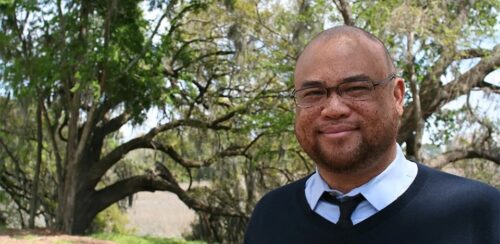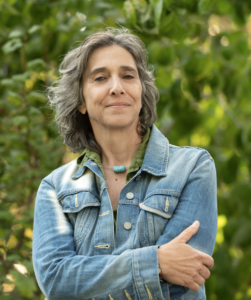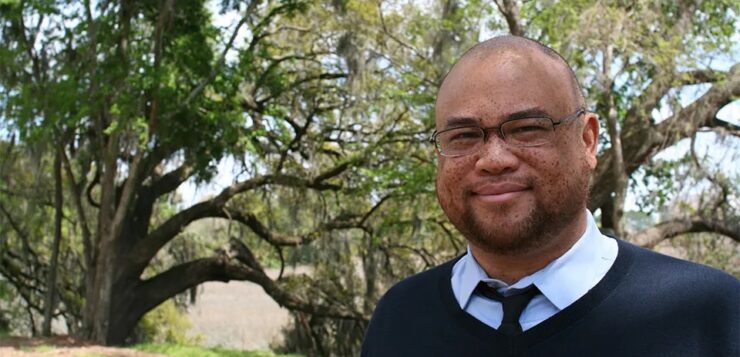
One of the many gifts of gay Midwestern poet Sjohnna McCray, who died last summer at age 51, was his unflinching truth-telling—about middle-aged love, male vulnerability, and what it was like growing up in a body that refused to comply with mainstream ideals of whiteness or Blackness. Born in Cincinnati, Ohio, McCray earned a BS from Ohio University and later obtained a MFA in Poetry from the University of Virginia. In Rapture (2016), his first and only book of poetry, McCray explores the complexities of growing up as a comic book reading nerd, the son of a black Vietnam Vet father and a Korean ex-prostitute mother who suffered severe schizophrenia. The poet explained in an interview that it took him a long time to embrace his complexity, his “oddity” as he put it, and that he hoped his work would bring a sense of ease to others who also felt like outcasts:
“I longed for the skin of my father’s family which I recognized as a parallel dimension of normal: brown like tree bark, brown like the earth, and of course, brown like Martin Luther King Jr. I wanted a head of tiny black curls which I could brush into suave waves like my cousins. I wanted to be either/or, anything but this stuck-in-the-middle mix of kimchi and fried chicken.”
Poet laureate Tracy K. Smith, who selected Rapture for the Walt Whitman Poetry Award in 2015, describes the collection as “fearless in its ability to name and claim the collective harms we live with and the complexities of individual inheritance.”
McCray’s writing focuses on his complex identities in an expansive and non-reductive way. Each a worthy subject, McCray unpacks all facets of his identity, as they are also portals into further exploration. For McCray, there is always more to identify and sort through. He refuses shortcuts and instead insists on the full dimensionality of life. Perhaps the quality that most describes his work and voice is the tender vulnerability he brings to his writing—a quality at odds with stereotypes of masculinity.
McCray’s father is the subject of many of his poems. Although the two were different from one another—McCray describes himself as “obnoxiously” sensitive—his father was a primary force in his life. McCray brings a keen observance and respect to his father in everything he writes. In the poem that opens Rapture, his father is old and debilitated by diabetes. The poet bathes his father, describing a tender and caring moment: “Father on his chair/ underneath the shower’s spray./ Tonight, you flip the night/ as if it were a card./ You scrub his back,/ move briskly through the arms. /You match the constellations/ each to a different longing./ So light you’re hefting nothing.”
McCray’s father’s body was ravaged by diabetes by the time the poem was published. It is a vulnerability that McCray shares, passed down from the ancestors, as McCray writes. Instead of looking away, the McCray confronts their shared frailty and his writing takes on a kind of surrender. There is no denial here.
In “Love and Illness,” an essay published after Rapture, he recalls diabetes’ deep roots in his family and remembers growing up with syringes, needles, and family members who had to check their “sugar.” When diabetes comes for him, he is honest about the toll it takes. In a scene in which he describes experiencing renal failure, he realizes that the family disease has finally caught up with him. Illness connects McCray to himself and his family but also to love.
The poet says that one of the things he set out to do in Rapture was write “a middle-aged love poem full of bellies and compromise.” In the collection’s title poem, he captures a moment in which he and his husband lie intertwined their bodies neither young nor blemish-free. In the dim light, they hold back from climax to stay connected, listening to walnuts drop onto the roof, refusing “to yield back into being singular.”
The two themes braid together in “Love and Illness,” in which McCray describes another Sunday morning—this time waking up and instinctively covering up his middle-aged body to hide his scarred torso. His husband stops him and says he accepts and loves McCray’s scars. “I tell him, he has to say that because he’s my husband. In reality, he’s the person whose opinion of my body matters the most, the person I feel I’ve let down by not winning some genetic lottery. He shakes his head and traces the scar that looks like a dark red minus sign and says, ‘Each one of these has kept you here with me.’”
McCray’s life and work were cut short but the tender vulnerability of his writing endures. It stands as a corrective to the toxic masculinity awash in American culture. A violent and dehumanizing force that seeks to rob us all of our authenticity and compassion for ourselves and for one another. McCray’s work then is an antidote. A path that leads us back to the animal of our own bodies. And back to love.

Leslie Absher is a journalist and essayist. Her work has appeared in the New York Times, Los Angeles Times, Independent, Salon, Huffington Post, Ms., and the San Francisco Chronicle. Her memoir Spy Daughter, Queer Girl is about growing up with a spy and the cost of keeping secrets. Leslie taught G.E.D. to high school dropouts and currently teaches writing and study skills to middle school and high school students. She lives in Oakland with her comic book writer/lawyer wife. You can follow her work here.






